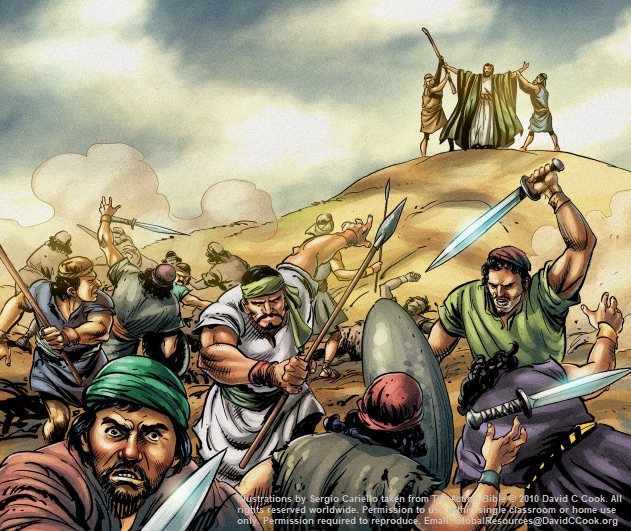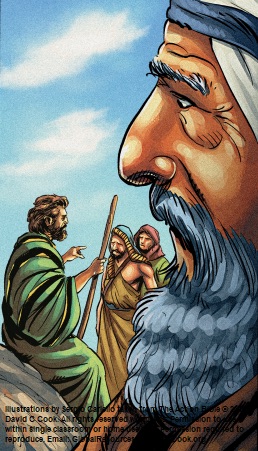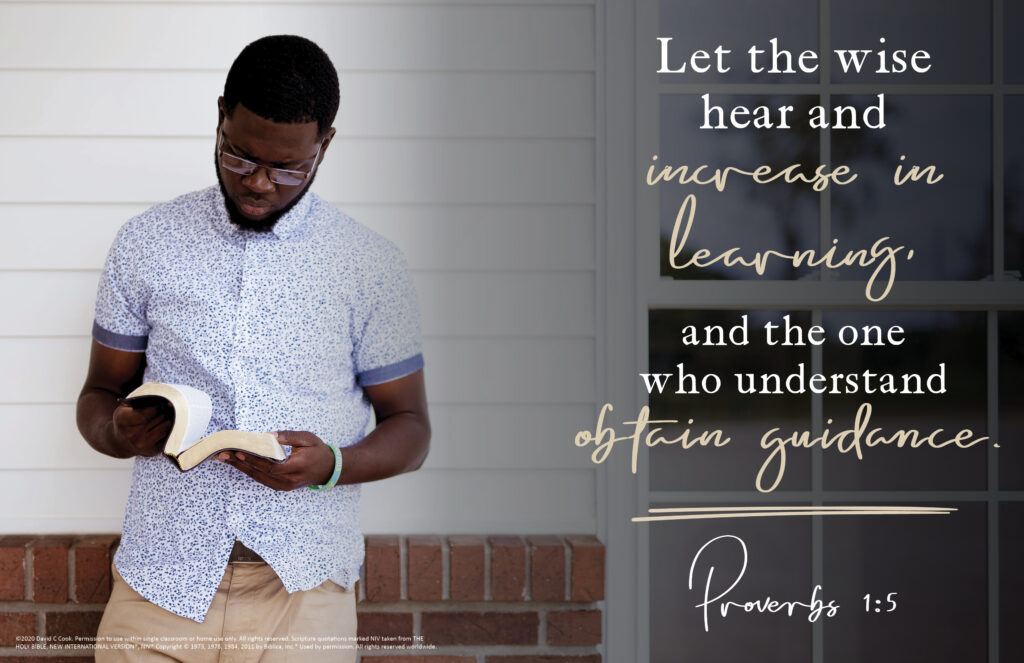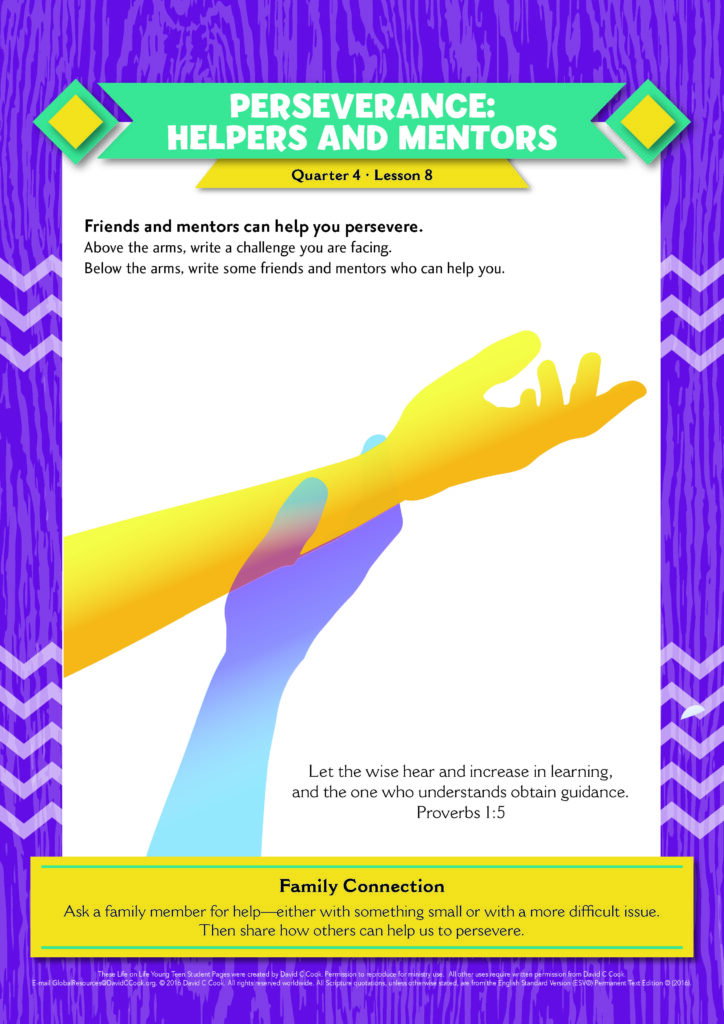During the lesson, the information for you to know is written in regular type, and what we suggest speaking or reading aloud to children is in bold. All resources for this lesson, including the Teacher Guide, Student Page, Family Connection Card, and other resources can be downloaded in a ZIP file by clicking on the following link:
In some lessons you will find "resource articles." These are articles written by experts from around the world to help equip you for your work with children and adolescents. Share them with parents or guardians if you consider it appropriate.
Carry each other’s burdens, and in this way you will fulfill the law of Christ.
Galatians 6:2
When we face situations of difficulty, we often try to carry the heavy weight on our own. We use our own strength to bear the burden of our troubles—and we often become overwhelmed by the weight. But the Lord has called us to carry one another’s burdens so that we can help each other and become more like Christ.
Do you have someone in your life you can trust to give you good advice? Someone who will always speak the truth to you in love? Do you do the same for others? To truly fulfil God’s plan for your life, you need to learn to help others and allow others to help you. So, the next time help is offered, accept it. Do not consider needing help as a sign of weakness. Instead, remember that it is God’s grace extended through human hands. He wants us to carry the burdens of life together so that we can truly know His great love for us. How can you show that same love to others?
Encourage the students to ask their family members for help—either with something small or with issues they are struggling with. The students can then share that others can help us with perseverance.
Teacher Tip: If possible, email or text the Family Connection Card to the families of your students.
Form groups of 5 teens, and give each group 5 rags, pieces of newspaper, or stones. If only have 5 items available, have the groups take turns. Each group should come up with a different way to do the activity.
Tell your students to imagine that there is a wide river running through the centre of the class area. The river is full of crocodiles (or snakes or other aquatic predators in your area). The only safe way to cross the river is by using the rags, newspapers, or stones. Their task is to get their whole group from 1 side of the room to the other without falling into the river. They must work together as a team to get all group members across safely. For example, they may use the rags or newspapers to build a bridge and step from 1 rag to another. Make sure the “river” is wide enough so that this will not be easy.
If the teens need help thinking solutions, here are some ideas. A teen could put rags under her feet and shuffle across, but she must find a way to get the rags to her team members so they can cross. A teen might throw a rag or paper, then jump on it, and then throw another piece and jump. He must make sure others will be able to jump to safety, too. Or, a strong teen might carry a smaller teen from 1 rag to another. If using this option, be sure boys carry boys and girls carry girls. Allow 2–3 minutes for the groups to work together to solve the problem. When everyone is across, have the teens sit down. Then ask the following questions of the whole group.
Students may answer that sometimes we need others’ help to persevere. We might need help physically doing something, or we might need good ideas. Seeing others persevere also helps us.
Allow the students to share their thoughts.
As we have learned, persevering means that you continue to move forward, even when doing so is difficult. We have talked about how you can persevere on your own, but sometimes we are more successful when we ask for the help of others.
Moses was a leader who understood the value of asking for and accepting help. God called Moses to lead the people of Israel out of slavery in Egypt, and Moses led them for many years after that. He persevered through many trials and difficulties as he led God’s people, but he did not do it alone. God provided others to encourage him, to help him, and to mentor him.
When Moses was taking care of sheep in the wilderness, God spoke to him from a burning bush. God told Moses that he would lead God’s people out of slavery. Listen to how Moses responded to this:
Ask a student to read Exodus 4:10–12 aloud from the Bible.
Moses said to the Lord, “Pardon your servant, Lord. I have never been eloquent, neither in the past nor since you have spoken to your servant. I am slow of speech and tongue.” The Lord said to him, “Who gave human beings their mouths? Who makes them deaf or mute? Who gives them sight or makes them blind? Is it not I, the Lord? Now go; I will help you speak and will teach you what to say.”
Exodus 4:10–12
Students may answer that God told Moses that He was in control and that He would give Moses words to speak. He gave Moses confidence.
Students may answer that Aaron gave him confidence and encouraged him. Aaron helped him in the areas where he was weak.
With help from the Lord and Aaron, Moses successfully led the Israelites out of slavery and into the wilderness, where God took care of them. Many years before He rescued the Israelites from Egypt, God had told His people that He would lead them to a place where they would live in peace and freedom. But even after He freed them from slavery, the Israelites were not obedient to God. Because of this, they wandered in the wilderness for nearly 40 years before they were allowed to enter the land God had promised them.
While they were in the wilderness, the Israelites were vulnerable to attacks from their enemies because they did not have a city with walls to protect them. And because they had lived in slavery for many years, the Israelites had never fought in a battle before.
During the Israelites’ first battle, Moses, Aaron, and another leader, Hur, went up to the top of a hill to oversee the fighting. Whenever Moses held up his hand, Israel did well in the battle. But whenever he lowered his hand, Israel began to lose to their enemies.
This was an important responsibility and a heavy burden for Moses. Let’s hear what happened.
Ask a student to read Exodus 17:12 aloud from the Bible. Show the image of Aaron, Hur, and Moses from The Action Bible, if possible.
When Moses’ hands grew tired, they took a stone and put it under him and he sat on it. Aaron and Hur held his hands up—one on one side, one on the other—so that his hands remained steady till sunset.
Exodus 17:12
Students may answer that Moses could not have persevered because he was exhausted. Aaron and Hur worked together with him so Israel would win the battle.
If possible, show the images of Moses and Jethro from The Action Bible as you tell the following story.



Not long after the battle was won, Jethro, Moses’ father-in-law, came to visit Moses. Jethro rejoiced over all the great things that the Lord had done to help the people of Israel. He also saw how difficult it was for Moses to lead God’s people.
While Jethro was visiting, Moses sat to judge the Israelites. He shared God’s laws with the people to help them solve their problems and settle their conflicts. But the Israelites had so many needs that Moses sat from morning until evening helping them.
Ask a student to read Exodus 18:14–18 aloud from the Bible.
When his father-in-law saw all that Moses was doing for the people, he said, “What is this you are doing for the people? Why do you alone sit as judge, while all these people stand around you from morning till evening?” Moses answered him, “Because the people come to me to seek God’s will. Whenever they have a dispute, it is brought to me, and I decide between the parties and inform them of God’s decrees and instructions.” Moses’ father-in-law replied, “What you are doing is not good. You and these people who come to you will only wear yourselves out. The work is too heavy for you; you cannot handle it alone.”
Exodus 18:14–18
Students may answer that Jethro noticed that Moses had too much work to do, thought about the problem, and offered wise advice.
Students may answer that having someone to lead Moses in the right direction and give him good advice was helpful. It was also helpful to have godly counsel.
Jethro was a mentor for Moses. A mentor is a wise and trusted teacher or counsellor. This may be a family member, a neighbour, a pastor, an older student—anyone who can understand your situation and give you wise and godly advice. It should be someone you trust and someone who treats you with respect. A wise mentor can help you to persevere through difficult situations by assisting you, advising you, and praying with and for you. A mentor can also hold you accountable, which means encouraging you to do what you need to do. Though you do not need to have a mentor, meeting on a regular basis with someone who cares about you and supports you can be helpful.
Ask a student to read Proverbs 1:5 aloud from the Bible. Show the Memory Verse poster, if you are using it.
Let the wise listen and add to their learning, and let the discerning get guidance.
Proverbs 1:5

Students may answer that advice and assistance can help you to solve your problems in a better way.
In some situations, we can persevere on our own. We can continue to endure our difficult situations with patience and resilience or continue to take small steps toward our goals. In other situations, we cannot persevere without help. I will give you some examples of situations in which you might need help to persevere. Talk about who could encourage, support, or mentor you in each situation.
Ask students to work in groups of 3–4. Pause after each statement, and give the groups 1 minute to discuss each situation.
Sometimes we need to go to different people for help in different situations. For example, a classmate might be able to help with your school difficulties but may not be able to help you to stop using drugs. It may be helpful to find a mentor who can encourage you, support you, and hold you accountable in many areas.
Think of your own situations. In what ways do you need support from others so you can persevere well? Who can give you encouragement, compassion, or companionship in a situation where you are struggling? Who can give you advice, ideas, or strategies to help you solve a problem?
Pause for a minute to allow the students to think.
Optional: If you are using the Student Pages, the teens can use these pages to write about their difficulties and write the names of people who can help and mentor them.

Now that you have considered how you need support to persevere well, focus on who can provide that help. Think of someone in your life who can give you the advice or encouragement you need. It should not be someone who will say only what you want to hear. It should be someone who will tell you the truth in a respectful way to help you to become a better person.
Pause for a minute to allow the students to think.
There may be some situations in your life where you feel like there is no one you can talk to—no one who will understand. In those situations—and in every situation in your life—you can talk to God. He knows your difficulties and pain, and He always cares. You can seek the truth in His Word. Think or pray about asking God to help you to persevere through your difficult situation.
Pause for a minute to allow the students to think and pray.
If you would like to, you can share with your group members or ask them to pray for you. You do not have to share things that are especially painful or personal unless you want to. You can ask the others in the group to pray for you in your difficult situation without giving details. Whatever is shared in your group should not be shared with others.
Pause for a few minutes to allow the students to pray for each other. Then close class by saying a blessing over the teens based on Psalm 16:8.
Blessing: May you keep your eyes always on the Lord. With Him at your right hand, may you know that you can persevere, and may you not be shaken.
Lead the teens in singing this quarter’s song if possible.
Life on Life ©2020 David C Cook. Reproducible for home or classroom use only. All other uses require written permission from David C Cook [email protected]. All rights reserved.